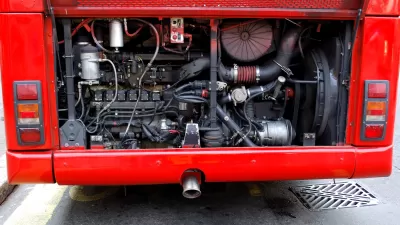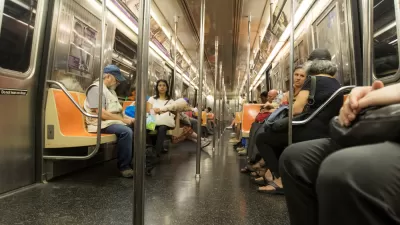Transit use is surging, but operators are facing the same fuel crunch as consumers and public monies for new investments aren't up to addressing the new demand.
"High gas prices are prying record numbers of Americans from their cars and onto buses, subways, and commuter trains. That has many pluses: It eases pocketbook expenses, road congestion, and pollution. But it's also straining providers of mass transit – a signal for needed change.
In Washington DC, the Metro subway and bus system is so stretched at peak hours that officials say the government and other large employers may have to mandate staggered work schedules if gas goes over $5 a gallon – once unimaginable.
In San Francisco and the Bay Area, seats near the doors of some BART trains have been removed to create more standing room for a surge in commuters. Meanwhile, about 20 percent of the nation's public bus operators have had to reduce service because of the high cost of diesel fuel, according to the American Public Transport Association (APTA).
Mass-transit ridership that's at its highest in 50 years presents an opportunity to beef up outdated systems in many areas of the country. But it's not going to be easy.
For starters, the same price pinch that's squeezing drivers is being felt by transit operators. They must pay more for fuel and their revenue sources are declining as the economy slows. More people may be exchanging traffic for tokens, but in some cases, fares cover as little as 20 percent of operating expenses. Mass transit depends greatly on local, state, and federal money – from sales taxes, for instance, which are slowing with the economy, and from gas taxes, which have not kept up with inflation.
As a result, public transit operators are increasing fares and delaying projects and improvements – just what the country doesn't need at a time of increased demand."
FULL STORY: For mass transit, mass investment

Planetizen Federal Action Tracker
A weekly monitor of how Trump’s orders and actions are impacting planners and planning in America.

Maui's Vacation Rental Debate Turns Ugly
Verbal attacks, misinformation campaigns and fistfights plague a high-stakes debate to convert thousands of vacation rentals into long-term housing.

Restaurant Patios Were a Pandemic Win — Why Were They so Hard to Keep?
Social distancing requirements and changes in travel patterns prompted cities to pilot new uses for street and sidewalk space. Then it got complicated.

In California Battle of Housing vs. Environment, Housing Just Won
A new state law significantly limits the power of CEQA, an environmental review law that served as a powerful tool for blocking new development.

Boulder Eliminates Parking Minimums Citywide
Officials estimate the cost of building a single underground parking space at up to $100,000.

Orange County, Florida Adopts Largest US “Sprawl Repair” Code
The ‘Orange Code’ seeks to rectify decades of sprawl-inducing, car-oriented development.
Urban Design for Planners 1: Software Tools
This six-course series explores essential urban design concepts using open source software and equips planners with the tools they need to participate fully in the urban design process.
Planning for Universal Design
Learn the tools for implementing Universal Design in planning regulations.
Heyer Gruel & Associates PA
JM Goldson LLC
Custer County Colorado
City of Camden Redevelopment Agency
City of Astoria
Transportation Research & Education Center (TREC) at Portland State University
Jefferson Parish Government
Camden Redevelopment Agency
City of Claremont





























